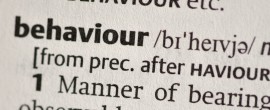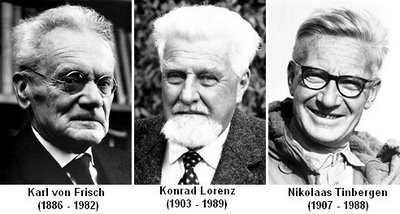 Simply put, it is the science of behaviour. But what does this involve exactly? Well, many things, in fact.
Simply put, it is the science of behaviour. But what does this involve exactly? Well, many things, in fact.
Let us start with what behaviour is. Definitions can be found in many sources, including any one dictionary, encyclopedia, scientific or popular article. Professor Langaney, my Introduction to Behavioural Biology teacher, described it as the way in which an organism responds to a stimulus in its environment. This definition is rather broad as it can be applied equally to a dog eating a cookie and to a tree growing its roots around obstacles in the ground. My personal favorite characterization of behaviour comes from a document published by the Association for the Study of Animal Behaviour: it “is a pervasive and fundamental property of living organisms, ranging from the simple responses of bacteria to the intricate social interactions of humans.”
It is clear, then, that behaviour does not solely concern animals, but in fact all living organisms, and that it can refer to observable as well as ‘less-observable’ actions.

Source: Sandwalk
I cannot forget to mention here Tinbergen’s 4 questions. They represent 4 interconnected categories of explanations for behaviour: the mechanisms of causation, the lifespan development (ontogenesis), the adaptive function and the evolution (phylogenesis).
Now, what about the nature of research in animal behaviour? As a matter of fact, topics in this domain are varied, diverse, multiple, <insert synonym here>. The reason for this is its essentially interdisciplinary and integrative quality. Behaviour is studied across different levels of analysis and explanation, through different taxonomic groups and levels of classification (from molecules to biological systems), in the laboratory and in the field. It therefore spans several fields of science, which include but are not limited to:
- evolutionary biology -> the descent and origins of species
- ecology -> the distribution and amount of organisms, and the interactions that determine them
- psychology -> the mind and behaviour
- anthropology -> human societies, cultures and their development
- neuroscience -> the structure and function of the brain and nervous systems
- physiology -> the way living organisms function
- molecular genetics -> the structure and activity of genetic material
That is not all, for there are also several ‘subdomains’ to ethology that can be grouped together according to the Tinbergen question they tend to try and answer. I might describe them more fully in future posts, but for now here are some examples: behavioural ecology, comparative psychology, cognitive ethology, behavioural genetics, animal welfare, sociobiology.
It seems like an entangled and complexe situation. It can be. However, this has a significantly positive repercussion in relation to schooling. Indeed, many roads lead to a career in animal behaviour research. There are even more roads if you take into account non-research professions such as animal training or veterinarian practice (and more).
This is where I would like to encourage anyone interested in animals and science to learn about and come join our multi-faceted ‘family’. Behaviour is complicated and so is life, so let us learn about it together!
I do not apologize for the corniness 😉
Main Reference:
The Association for the Study of Animal Behaviour (no date). Research in animal behaviour: what and why. Retrieved from http://asab.nottingham.ac.uk/downloads/brochure.pdf

Pingback: Reptilian Societies | Behaving Animals
Pingback: Professional associations in ethology / behavioural biology | Behaving Animals